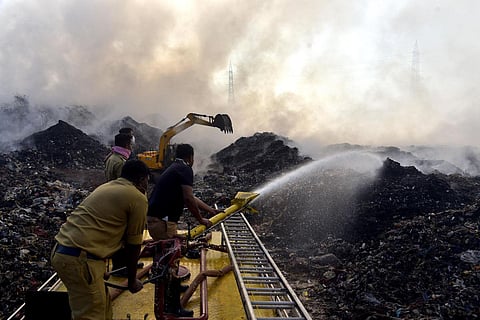

KOCHI: More details have emerged regarding the alleged backdoor deals made by councillors of both the Left Democratic Front (LDF) and United Democratic Front (UDF) in awarding contracts at the Brahmapuram waste treatment plant.
The plant has three major works — bio-mining of legacy waste, windrow composting of daily waste, and plastic waste segregation. The fumes emanating from the plant have exposed the corruption associated with these projects and how various political parties awarded contracts to their favourites.
Kochi Corporation officials claimed that they were under tremendous pressure to approve the Rs 54-crore bio-mining project by the Bengaluru-based Zonta Infratech. According to councillor C A Shakeer, Zonta had not carried out any work related to biomining at the site.
“As per the agreement, the company was assigned to move the Refuse-Derived Fuel (RDF) from the site after biomining. Instead, the government allowed Zonta to store the RDF in its 20 acres of land leased out to Kerala State Industrial Development Corporation Ltd. (KSIDC) to build a Waste-to-Energy plant. The company used power from the site and the corporation had to pay around Rs 11-12 crores without carrying out any work. All they have done is shifting the heap of legacy waste to a different area, bury it underground, or burn it,” he added. Interestingly, Zonta has given subcontract to another company for Rs 17 crore and it is alleged that the firm is related to a senior Congress leader.
Meanwhile, an official with the corporation said the state government, under the Disaster Management Act Provision, entrusted KSIDC to tender the bio-mining work.
“KSIDC issued the tender to Zonta. It had put the contract in place, and Kochi Corporation cannot go against the act and was just an implementing agency,” the official said.
When asked why the corporation paid Zonta if it was not satisfied with its work, the official said that initially, as per the contract condition by KSIDC, the corporation must pay the contractor 15% of the total amount once the tender is issued, which is Rs 8 crore.
“As per the contract, after every 25% land reclamation, we have to pay 15%. When Zonta submitted the file, the corporation wrote to the government that the work was not satisfactory and it would not pay the amount. Following this, the chief secretary called a meeting and sought clarification from KSIDC, which they submitted in favour of Zonta,” said an official.
“However, the corporation did not pay the firm, and LSGD Minister M B Rajesh called a meeting and told the corporation to pay 50% of the 15% amount to the company, which is Rs 4 crore,” the official added.
Plastic scam
The other major scam at Brahampuram is the plastic waste collection. For over a decade, the Kochi Corporation has not invited tenders for plastic waste collection and instead entrusted the work to a private firm, Bharat Private Limited.
Councillors claimed that the firm collects only good plastic and dumps the remaining at the site. The corporation has been selling plastic waste for Rs 1.5 per kg to the private firm, whereas the Kerala government-owned Clean Kerala Company collects waste from local self-government institutions at Rs 15-20 per kg.
‘CLEAR LEGACY WASTE FROM BRAHMAPURAM’
Kochi: The Kerala Sasthra Sahitya Parishad (KSSP) Ernakulam district committee suggested clearing the legacy waste from the plant as soon as possible. Disposal of degradable waste at home itself and banning plastic can help reduce the waste generated in the city to a great extent. Also, the KSSP suggested withdrawal of waste-to-energy projects and avoiding storing of legacy waste at the plant.